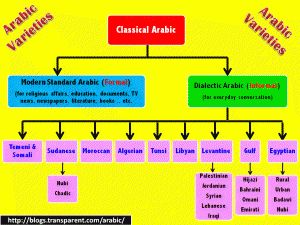Arabic! Which Arabic? Posted by Fisal on Dec 30, 2015 in Arabic Language, Culture, Grammar, Vocabulary
Ahlan, Arabic lovers! Today, I am going to continue my previous discussion about the Arabic language phenomenon that may have given a lot of people a headache (check my previous post The Arabic Headache; Dialect!). I will try to be brief and accurate as far as I can especially when there is no such solid scientific research on this linguistic phenomenon.
The Reality of Arabic
- There is only one Arabic language. This fact is the broad frame.
- Some people mistakenly think there are too many Arabics (Arabic varieties or dialects).
- The issue of the different Arabic varieties or dialects is a phenomenon that needs further linguistic study.
- Arabic Linguistics in general and the Historical and Social Linguistics of the Arabic language in particular are still lacking in solid scientific research and are newly-introduced areas of study at most universities.
- Classical Arabic (CA) and not Qur’anic Arabic, is the correct name as Arabic did exist before the Holy Qur’an was revealed.
- Even at the time of Classical Arabic, there were different dialects.
- Modern Standard Arabic (MSA) or Al-Fus’ha الفصحى is the formal Arabic of today.
- All Arabic dialects are informal Arabic.
- The most common names of informal Arabic are: dialect لهجة, slang or colloquial (= Ami’yah العامية or Da’rijah الدارجة).
- Culture plays an important role in the various Arabic dialects.
Modern Trends of Arabic Learning
There is no agreement among Arabic linguists and scholars on how people should learn Arabic. There are three main trends as follow:-
- MSA or Fus’ha only: The people who call for learning only MSA or Fus’ha are mainly radicals and religious figures. Their justification is only emotional as they fear that the language may be forgotten and that it is the language of the holy book. Surely, they are mistaken and not realistic. They themselves don’t use that formal language in their everyday life.
- Colloquial or Am’iyah (dialect) only: the supporters of such approach are the opposite of the first approach. Their excuse is that there is no need for all that grammar complexities as long as we use the language for communication in our everyday life and that we can sing and write poetry in Am’iyah. How nonsense! Those are mistaken and unrealistic again. We can never neglect the role of formal language and grammar.
- The Whole Language Approach: The third and more realistic trend is to look at dialect as a part of the language; a very important aspect of it. The supporters of such approach look equally at both Fus’ha and Am’iyah. A learner of Arabic should learn both; formal and informal as the informal explains the formal.
Which Arabic should foreigners start learning?
Native Arabic speakers learn the informal Arabic first and then when they go to school, they learn the formal Modern Standard Arabic. So, there is no problem for them even if they might find difficulties communicating with other Arabic speakers from other Arab cultures.
Now, this question is very important to the non-Arabic speakers as most of them are so confused when they are faced with the question of which Arabic they should learn? I answered this question in the previous post about The Arabic Headache; Dialect! I said that the matter is absolutely a personal choice. You and only you have to decide. It depends on your needs. Here are your choices:
- Learn the Fus’ha (MSA) First: This is the best advice to master reading and writing in Arabic. Start with Fus’ha if you are learning about Islam or literature or if you are not travelling to an Arab country soon or if you have not got that chance before; that is for academic purposes. The most advantage here is a higher accuracy and proficiency levels in both reading and writing. Speaking and listening will improve over time and practice. Dialect will be easy to follow afterwards.
- Learn the Colloquial or dialect (Am’iyah) First: This is the best advice for those who are not learning the language as a mandatory academic course. They are learning the language only for their own passion. They may have got the chance of travelling to an Arab country before. They may have got an immediate job in an Arab country and just need the language for everyday communication. They may just need the language for tourism or to listen to the music or learn about the culture. The most advantage of Am’iyah is a higher level of proficiency in listening and speaking. Reading and writing will improve only through formal study of Fus’ha.

Arabic Varieties Info-graphic
******
Check us back Soon
Peace سلام /Salam/

Build vocabulary, practice pronunciation, and more with Transparent Language Online. Available anytime, anywhere, on any device.
About the Author: Fisal
Well, I was born near the city of Rasheed or Rosetta, Egypt. Yes, the city where the Rosetta Stone was discovered. It is a small city on the north of Egypt where the Nile meets the Mediterranean. I am a Teacher of EFL.




Comments:
sana:
Hi! I am loving this blog! I am from Glasgow, now living in the UAE, and finally getting somewhere with Arabic.
Thank you!
Also can wen have some conversations that friends would have, say in a cafe, or when they are meeting to chat?
Thank you!
sana
Fisal:
@sana Ahlan sana,
Thank you for passing by and for loving the blog. We hope that you are enjoying your stay in the UAE. We will do our best to do some posts about everyday situations. Stay tuned! 🙂
Fisal